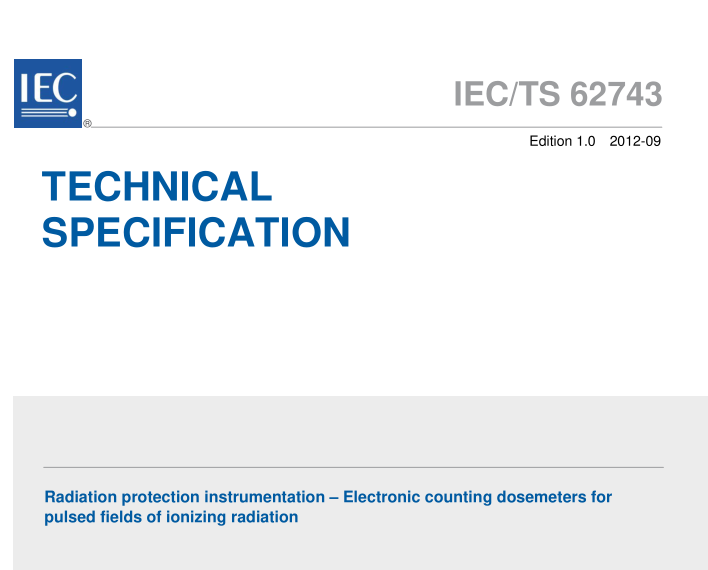IEC TS 62743:2012 pdfダウンロード

IEC TS 62743:2012 pdfダウンロード。Radiation protection instrumentation – Electronic counting dosemeters for pulsed fields of ionizing radiation
1 Scope
This Technical Specification applies to all types of counting dosemeters, irrespective of the measuring quantity and the type of radiation intended to be measured. It ensures that a single radiation pulse can be correctly measured even if the dosemeter is in the internal state relevant for measuring background or environmental radiation.
The characteristics of the dosemeter for repeated pulses is expected to be better than for one single radiation pulse with the same parameters but worse than for continuous radiation, i.e., in between of the characteristics for these two extreme conditions.
This Technical Specification does not specify the characteristics of the dosemeter for repeated pulses. The Technical Specification does not apply for those types of counting dosemeters that either – do not have an indication or software read-out of the dose rate and the number of pulses counted,
– convert the non-pulsed detector signal to counts by a converter,
or – use nuclear reactions to generate long and nearly continuous secondary radiation fields which then are measured by the dosemeter using counting techniques instead of measuring the direct radiation pulse. The pulsed radiation source is characterized by the parameters
– radiation pulse duration, t pulse ,
– pulse peak dose rate, peak pulse, H ,
– dose per radiation pulse, H pulse .
This Technical Specification considers the pulsation of the radiation field as an additional influence quantity like particle energy and direction of radiation incidence. Therefore, the tests described are additional to all the tests in the respective standards.
This technical specification describes methods to determine the characteristic parameters of the counting dosemeter. A prerequisite of the method is that the model function of the dosemeter can sufficiently be approximated by
where G dose
is the dose indication of the dosemeter,
G count
is the dose indication per counting event,
n count
is the number of counting events counted by the dosemeter, and
k dead
is the correction for dead time losses.
This simplified model function should not fully describe the dosemeter but it should be valid only – maybe with effective values – for the tests in the case of a single pulse occurring when the dosemeter is in the internal state relevant for measuring background or environmental radiation, i.e., the dosemeter has not performed any specific parameter adjustment for high dose rate. In this sense this simplified model function uses effective parameters specific for pulsed radiation.
- Previous:IEC TS 62622:2012 pdfダウンロード
- Next:ISO IEC 1001:2012 pdfダウンロード